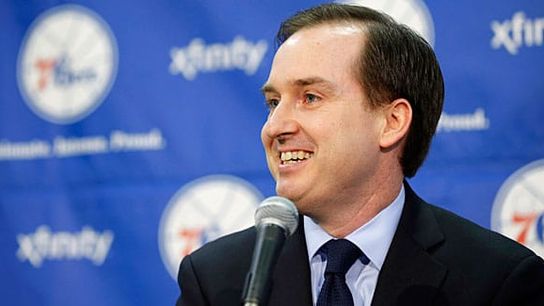Sam Hinkie resigned after 35 embattled months as the Philadelphia 76ers' general manager and president of basketball operations. NBA insiders say Hinkie's move was a preemptive strike against a pink slip as team chairman Jerry Colangelo was working to replace him with his son Bryan.
In a league where three-to-five clubs have a real chance at actually winning a championship in a given season and the absolute worst place to be is the middle, Hinkie treated the Sixers like a private equity managing partner, shedding players in search of draft picks and appreciable assets. Hinkie didn't invent tanking, he was just the first executive with the power to do so to take it to its logical extreme. After inheriting a 34-win team that was one year removed from a Game 7 with a shot at the Eastern Conference Finals and ripping it up from the roots. The result? Nineteen wins in 2014, 18 in 2015, 10 so far this season, and a enough naysayers to line Broad Street a dozen times over.
But none of those things in the above sentence bother Hinkie. In fact, they're part of the process. In a Jerry Magurie-style 13-page memo, Hinkie laid out the method behind his madness in a manifesto where he frequently quotes Elon Musk and Warren Buffett and Jeff Bezos -- drawing a line between they and he, no doubt -- but he does tap into a couple ideas that I found worthwhile.
On the importance of not just being right, but understanding why you're right:
To do this requires you to divorce process from outcome. You can be right for the wrong reasons. In our business, you’re often lionized for it. You can be wrong for the right reasons. This may well prove to be Joel Embiid. There is signal everywhere that Joel is unique, from the practice gyms in Lawrence, Kansas to Bala Cynwyd, Pennsylvania to Doha, Qatar where he does something awe inspiring far too regularly. We remain hopeful (and optimistic) about his long-term playing career, but we don’t yet know exactly how it will turn out. The decision to draft Joel third, though, still looks to me to be the correct one in hindsight given the underlying reasoning. But to call something that could be wrong (“failed draft pick”) right (“good decision”) makes all of our heads hurt, mine included. So we have to look deeper at process. Here’s a go at it: (I would be dismayed if you don’t see pockets of this kind of thinking....
A way to prop up this kind of humility is to keep score. Use a decision journal. Write in your own words what you think will happen and why before a decision. Refer back to it later. See if you were right, and for the right reasons (think Bill Belichick’s famous 4th down decision against Indianapolis in 2009 which summarizes to: good decision, didn’t work). Reading your own past reasoning in your own words in your own handwriting time after time causes the tides of humility to gather at your feet. I’m often in waist-deep water here.
On making decisions with the future in mind:
Jeff Bezos says that if Amazon has a good quarter it’s because of work they did 3, 4, 5 years ago—not because they did a good job that quarter. Today’s league-leading Golden State Warriors acquired Draymond Green, Andrew Bogut, and Klay Thompson almost 4 years ago, nearly 4 years ago exactly, and almost 5 years ago. In this league, the long view picks at the lock of mediocrity....
Ask who wants to trade for an in-his-prime Kevin Garnett and 30 hands will go up. Ask who planned for it three or four years in advance and Danny Ainge is nearly alone. Same for Daryl Morey in Houston trading for James Harden. San Antonio’s Peter Holt said after signing LaMarcus Aldridge this summer, “R.C. [Buford] came to us with this plan three years ago, four years ago—seriously. And we’ve worked at it ever since.”
On why sports necessitates innovation:
The same 82 games are up for grabs every year for every team. Just like in 1985 (or before). To get more wins, you’re going to have to take them from someone else. Wins are a zero growth industry (how many of you regularly choose to invest in those?), and the only way up is to steal share from your competitors. You will have to do something different. You will have to be contrarian.
Howard Marks describes this as a necessary condition of great performance: you have to be non-consensus and right. Both. That means you have to find some way to have a differentiated viewpoint from the masses. And it needs to be right. Anything less won’t work.
Hinkie writes with an obvious hope this memo will be pulled out of some file cabinet and hoisted overhead alongside the Larry O'Brien Trophy someday, that the course he set the Sixers on will eventually prove he saw the forest while the rest of the NBA stared slack-jawed at the trees. Maybe it will. Maybe it won't. But either way, Hinkie's Grand Experiment is an interesting case study in decision making in sports.
